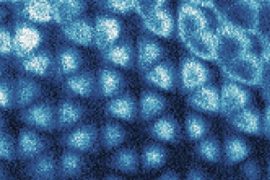Mouth bacteria reveal new approach to cancer
so called fusobacteria are often part of oral flora, But bacteria can also settle in other parts of the body. they are especially common cancer tissue to find. A research team is now investigating why there are germs in the mouth tumor frozen and for them growth contributes.
researchers of Helmholtz Center for Infection Research A current study examined why oral cavity germ Fusobacterium nucleatum It is commonly found in tumor tissue and how bacteria interact with cancerous tissue. Research results recently published in the famous journal “PNAS” Presented.
Fusobacteria linked to cancer
It was known before the investigation that fusobacteria with different cancer Stay in Touch. However, the background of this relationship was not sufficiently understood.
Using the latest technology, the working group at the Helmholtz Center has now been able to shed more light on this relationship. Among other things, the team discovered a potential regulator for the adhesion of microorganisms to tumor cells and new therapeutic targets disclosed.
Humans are home to more than 4,500 species of bacteria
stay in man Over 4,500 different types of bacteria, Many species have fully adapted to humans during evolution and contribute to maintaining health, such as bacteria in healthy intestinal flora, Other bacteria or bacterial strains are known to be pathogenic.
health effects often unclear
The importance of different types of bacteria to a person’s health and well-being is currently being investigated in several different studies. Although its understanding has improved in recent years, many of the effects of bacteria in humans are still unclear.
Fusobacteria part of the oral flora
This also applies to Fusobacteria. They are often found in the oral flora of humans. but also in cancerous tissue, especially breast and colon cancer, bacteria are often detected. Other than this cancer Involvement in the esophagus and pancreas is suspected.
Fusobacteria in cancer tissue
The presence of Fusobacteria in cancerous tissue is associated with an increased risk of tumor growth as well for formation of metastasis and with a general worse forecast in connection.
But how do the microbes of the oral cavity enter the tumor and why do they like to settle there? This was the central question of the present research work.
Fusobacteria are largely unexplored
“Fusobacteria are highly relevant clinically, but little research has been done on their own”Related study confirms author Jörg Vogel, One goal of their working groups is to understand at the molecular level how these microorganisms function. from the conclusions New strategy against cancer be derived.
As the study authors explain, Fusobacterium nucleatum is a strain of bacteria that evolved early from other known bacteria, such as Escherichia coli (E. coli). Therefore findings from other widespread bacterial species cannot necessarily be transferred to Fusobacteria.
New fundamental knowledge about Fusobacteria
Using a new technique called fluorescence imaging, the team was able to identify the microorganisms Display and track detail for the first time,
“In a previous study, we had already established that a small regulator ribonucleic acid, the so-called sRNA, regulates a protein in the outer bacterial cell membrane.”Report of the first author of the study Falk Ponathi,
“We were now able to analyze this mechanism in more detail and it involved a specific adaptation factor that represses various proteins in the cell envelope.”Ponath continues.
According to the researchers, this adaptation factor reacts strongly to oxygen, leading to an increase in sRNA.
As the working group was also able to demonstrate, Fusobacteria use proteins in their cell envelope to interact with the host. Whether the discovered processes are ultimately responsible for the increased colonization of Fusobacteria in cancer tissue has yet to be clearly elucidated.
New therapeutic approaches in the fight against cancer
Nevertheless, the team was able to elucidate many fundamentally new mechanisms of germs and accelerate further research in bacteria. scientists see in The Link Between Fusobacteria and Cancer A fundamentally new therapeutic approach fight against cancer, (VB)
Author and source information
This text matches the requirements of medical specialist literature, medical guidelines and current studies and has been checked by medical professionals.
Author:
Graduate Editor (FH) Volker Blasecki
Source:
- Helmholtz Center for Infection Research: Fusobacteria and Cancer (Published: 11/03/2022), helmholtz-hzi.de
- Ponath F, Zhu Y, Kosi V, Vogel J, et al. Expanding genetic toolkit helps dissect global stress response in early branching species Fusobacterium nucleatum; In: Proceedings of the National Academy of Sciences (2022). DOI: 10.1073/pns.2201460119, pnas.org
Important Articles:
This article contains general advice only and should not be used for self-diagnosis or treatment. He cannot take the place of visiting the doctor.

Web guru. Amateur thinker. Unapologetic problem solver. Zombie expert. Hipster-friendly travel geek. Social mediaholic.





